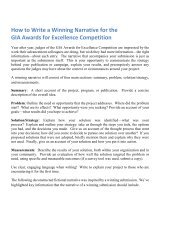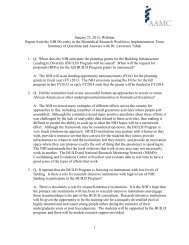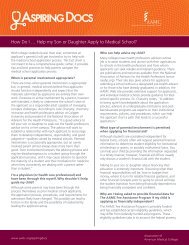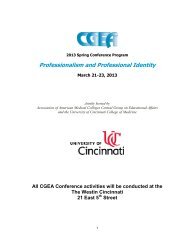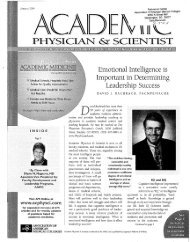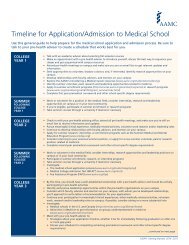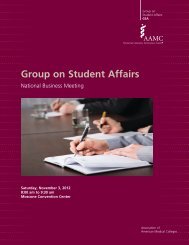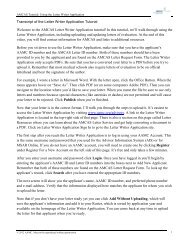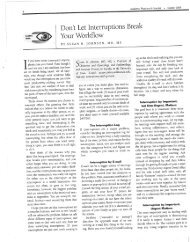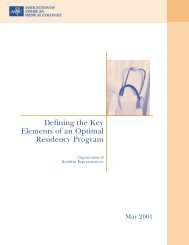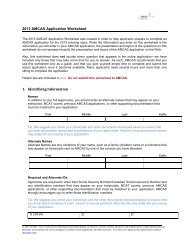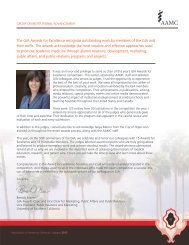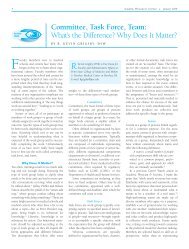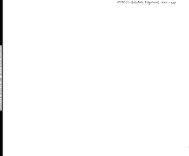2013 Poster Session Summaries - AAMC
2013 Poster Session Summaries - AAMC
2013 Poster Session Summaries - AAMC
You also want an ePaper? Increase the reach of your titles
YUMPU automatically turns print PDFs into web optimized ePapers that Google loves.
PULSE is a year-long program that exposes students from Proviso Math and Science Academy in Maywood,<br />
IL to a variety of areas in the medical profession. Physicians and other medical professionals present<br />
aspects of their practice to students each month and assists the students as they attempt these clinical skills.<br />
Additionally, the students are grouped with current medical school students to foster a mentoring relationship<br />
that will hopefully pique and encourage their interest in medicine outside of what they learn in the classroom.<br />
Both programs seek to improve the representation of people of color in the health professions in order to<br />
address a diversifying and increasingly chronically ill population.<br />
LOYOLA UNIVERSITY CHICAGO STRITCH SCHOOL OF MEDICINE [<strong>Poster</strong> # 17]<br />
Program/Project Title: Peer-Led Medical Spanish<br />
Presenter(s): Mary Calderone, Sarah Hale, Isabel Malone & Andrew Tully<br />
Email: imalone1@luc.edu<br />
Peer-Led Medical Spanish is an elective course offered to Stritch medical students, Marcella Niehoff School<br />
of Nursing students, and interested faculty and administrators. First and second year medical students with<br />
an advanced or fluent knowledge of Spanish are able to earn a two week elective teaching credit by creating<br />
lesson plans, teaching classes on a weekly basis, compiling a portfolio of their work, and attending teaching<br />
seminars throughout the year. Classes themselves are offered at varying levels on a weekly basis. From<br />
complete beginners to native speakers, classes are designed to meet students at their level and provide<br />
language tools that will be invaluable skills for their current or future careers in healthcare.<br />
The number of Spanish-language speakers living in the United States has grown exponentially over the past<br />
decade, and that trend is projected to continue into the upcoming years as well. Therefore, as medical<br />
students dedicated to providing the best quality of patient care possible, we find it of the utmost importance<br />
that students are given an opportunity to learn, improve upon, and practice their Spanish communication<br />
skills, especially in a medical context. By attending classes, students learn essential medical vocabulary and<br />
are given the opportunity to practice patient interviews with their classmates and teachers in Spanish.<br />
Teachers are not only earning elective credit, but advancing their own skills and gaining valuable teaching<br />
skills to take into their careers. Since the program's initiative five years ago, classes have been growing in<br />
popularity, and have been widely attended by first and second year medical students.<br />
During the <strong>2013</strong>-2014 academic year, nursing students from Loyola University Marcella Niehoff School of<br />
Nursing will be collaborating with medical students and taking the same medical Spanish courses for the first<br />
time. We hope that this collaborative effort will continue to foster an environment of teamwork between all<br />
healthcare professionals. Finally, at the conclusion of their second year of medical school, advanced<br />
students are encouraged to take Loyola's Medical Spanish Certification exam. Upon passing this exam,<br />
students earn the legal right to translate for their Spanish-speaking patients during their third and fourth year<br />
clerkships. The Peer-Led Medical Spanish Program has been a tremendous success at Loyola Stritch<br />
School of Medicine, and we would love the opportunity to share this program with other interested schools.<br />
MEDICAL COLLEGE OF WISCONSIN [<strong>Poster</strong> # 18]<br />
Program/Project Title: Structure of Early Clinical Experiences Program within the Discovery<br />
Curriculum<br />
Presenter(s): Anish Patel & Melanie Bobbs<br />
Email: ahpatel@mcw.edu<br />
The Medical College of Wisconsin (MCW) debuted its new Discovery Curriculum in the fall of 2012. Among a<br />
host of updates to the preclinical curriculum was the introduction of several early clinical experiences. These<br />
experiences, which extend throughout the first two years of medical school, are designed to introduce<br />
students to clinical practice early on and prepare them for their clinical years. The structure of the Program<br />
begins with learning basic clinical competencies for working in the clinics during the first semester. For the<br />
next two semesters, students attend clinical apprenticeships one half day per week, where preceptors<br />
mentor students, observe respective levels of patient care and provide direct feedback. The final semester<br />
includes a Capstone project that allows students to hone the skills they have absorbed in the clinic with<br />
exposure to specialized and more complicated patient populations. While medical schools throughout the<br />
12



